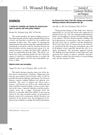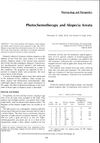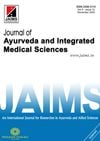 2 citations,
October 2004 in “Drug Information Journal”
2 citations,
October 2004 in “Drug Information Journal” The conclusion is that combining social and cultural factors with pharmaceutical research could improve our understanding of how drugs work.
143 citations,
June 1983 in “Archives of dermatology” Mental and social factors greatly affect skin conditions and doctors find it hard to deal with these aspects.
 September 1997 in “JEADV. Journal of the European Academy of Dermatology and Venereology/Journal of the European Academy of Dermatology and Venereology”
September 1997 in “JEADV. Journal of the European Academy of Dermatology and Venereology/Journal of the European Academy of Dermatology and Venereology” Psychological factors play a significant role in developing alopecia areata.
 1 citations,
October 1984 in “Clinics in dermatology”
1 citations,
October 1984 in “Clinics in dermatology” People distressed by minor skin changes should consult dermatologists with cosmetic expertise, and a public Cosmetic Dermatology Service with mental health support is recommended.
 February 2003 in “Journal of Cutaneous Medicine and Surgery”
February 2003 in “Journal of Cutaneous Medicine and Surgery” Fine hairs improve male pattern baldness treatment, alopecia areata causes remain unknown, and hair can recover from dye damage over time.
 December 2023 in “Current psychosomatic research”
December 2023 in “Current psychosomatic research” Psychological interventions can improve the quality of life for women with PCOS.
 43 citations,
March 2011 in “Journal of psychosomatic research”
43 citations,
March 2011 in “Journal of psychosomatic research” Kids with alopecia areata may experience more stress but not necessarily feel more anxious or depressed than others.
 8 citations,
April 2015 in “Advances in Psychosomatic Medicine”
8 citations,
April 2015 in “Advances in Psychosomatic Medicine” Psychotropic medications can cause skin problems but also treat some skin conditions.
 January 2005 in “Korean Journal of Psychosomatic Medicine”
January 2005 in “Korean Journal of Psychosomatic Medicine” Women with alopecia often experience high levels of anxiety and depression, needing psychiatric help.
 January 2002 in “Dermatology + psychosomatics”
January 2002 in “Dermatology + psychosomatics”  10 citations,
May 1983 in “International Journal of Dermatology”
10 citations,
May 1983 in “International Journal of Dermatology” Some people with severe hair loss saw hair regrowth after a specific light and drug treatment.
 February 2024 in “Journal of ayurveda and integrated medical sciences”
February 2024 in “Journal of ayurveda and integrated medical sciences” Ayurvedic treatments helped a 16-year-old regrow hair after modern medicine failed.
 118 citations,
July 2005 in “Journal of Ethnopharmacology”
118 citations,
July 2005 in “Journal of Ethnopharmacology” Eclipta alba extract improved learning, memory, and stress-related ulcers in rats without affecting movement or causing anxiety.

research Acne
58 citations,
January 1997 in “Dermatologic Clinics” Acne significantly affects mental health and quality of life, with research suggesting hormonal and genetic factors in its development and emphasizing early treatment to prevent scarring.
 30 citations,
May 1991 in “Psychosomatics”
30 citations,
May 1991 in “Psychosomatics” Some psychiatric medications can cause reversible hair loss.
 9 citations,
December 2014 in “Neuropsychiatric Disease and Treatment”
9 citations,
December 2014 in “Neuropsychiatric Disease and Treatment” People with first-time vitiligo have lower levels of a certain brain protein compared to healthy individuals.
 5 citations,
May 2017 in “Journal of the European Academy of Dermatology and Venereology”
5 citations,
May 2017 in “Journal of the European Academy of Dermatology and Venereology” The study found no significant difference in stress hormone levels between people with alopecia areata and healthy individuals, suggesting that the disease is not caused by an overactive stress response system.
 4 citations,
January 2011 in “Journal of UOEH”
4 citations,
January 2011 in “Journal of UOEH” Autoimmune hair loss may be linked to increased Th1 and Th17 cells and decreased Th2 cells.
 421 citations,
April 2012 in “The New England Journal of Medicine”
421 citations,
April 2012 in “The New England Journal of Medicine” Alopecia Areata is an autoimmune condition causing hair loss with no cure and treatments that often don't work well.
 295 citations,
January 2006 in “Journal of the American Academy of Dermatology”
295 citations,
January 2006 in “Journal of the American Academy of Dermatology” Alopecia areata, a common autoimmune hair loss condition, often runs in families.
 191 citations,
May 2018 in “British journal of dermatology/British journal of dermatology, Supplement”
191 citations,
May 2018 in “British journal of dermatology/British journal of dermatology, Supplement” Alopecia areata is likely an autoimmune disease with unclear triggers, involving various immune cells and molecules, and currently has no cure.
 148 citations,
December 2018 in “Journal of autoimmunity”
148 citations,
December 2018 in “Journal of autoimmunity” Alopecia areata is an autoimmune disease causing patchy hair loss, often with other autoimmune disorders, but its exact causes are unknown.
 122 citations,
November 1984 in “Journal of the American Academy of Dermatology”
122 citations,
November 1984 in “Journal of the American Academy of Dermatology” No single treatment is consistently effective for alopecia areata, and more research is needed.
 67 citations,
July 2016 in “Reviews in Endocrine and Metabolic Disorders”
67 citations,
July 2016 in “Reviews in Endocrine and Metabolic Disorders” Stress can worsen skin conditions by affecting hormone levels and immune response.
 45 citations,
March 2010 in “Journal der Deutschen Dermatologischen Gesellschaft”
45 citations,
March 2010 in “Journal der Deutschen Dermatologischen Gesellschaft” A systematic approach is crucial for managing hair loss in women.
 30 citations,
March 2015 in “Clinical Endocrinology”
30 citations,
March 2015 in “Clinical Endocrinology” Young women with high male hormone levels or PCOS often feel more psychological distress and have a lower quality of life.
 28 citations,
May 2013 in “The Journal of Steroid Biochemistry and Molecular Biology”
28 citations,
May 2013 in “The Journal of Steroid Biochemistry and Molecular Biology” Testosterone therapy can improve sexual desire and function in postmenopausal women but should be used cautiously and not based solely on testosterone levels.
 26 citations,
December 2015 in “Journal of The European Academy of Dermatology and Venereology”
26 citations,
December 2015 in “Journal of The European Academy of Dermatology and Venereology” New method measures female hair loss: Female Pattern Hair Loss Severity Index (FPHL-SI).
 18 citations,
January 2001 in “Annual Reports in Medicinal Chemistry”
18 citations,
January 2001 in “Annual Reports in Medicinal Chemistry” Selective Androgen Receptor Modulators (SARMs) are drugs that can control the effects of androgens in different tissues, potentially having fewer side effects and promising for treating various conditions.
 14 citations,
January 2019 in “Skin appendage disorders”
14 citations,
January 2019 in “Skin appendage disorders” PFS might be a delusional disorder with potential to become mass psychogenic illness.





























